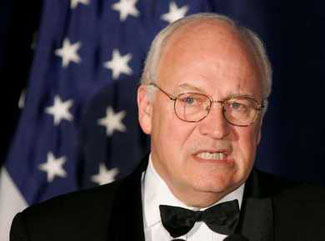What if I told you that there were no longer three co-equal branches of government, that the Executive Branch now held powers that could not be checked by Congress or the Courts? What if the President could ignore every law that Congress passed? Would you consider it a constitutional crisis? Former US Assistant Attorney General Jack L. Goldsmith did?
It's called "Unitary Executive" theory, and it's premise is that the Constitution gurantees the President unlimited power to protect the nation in a time of emergency.
Frontline recently broadcast "Cheney's Law", an examination of the VP's lifelong political quest. The segment opens with:
"For three decades Vice President Dick Cheney conducted a secretive, behind-closed-doors campaign to give the president virtually unlimited wartime power. Finally, in the aftermath of 9/11, the Justice Department and the White House made a number of controversial legal decisions. Orchestrated by Cheney and his lawyer David Addington, the department interpreted executive power in an expansive and extraordinary way, granting President George W. Bush the power to detain, interrogate, torture, wiretap and spy — without congressional approval or judicial review."
Charlie Savage is right there with Goldsmith. The Pulitzer-prize winning reporter from the Boston Globe, calls out "Unitary Executive" theory for what it is in his book Takeover: The Return of the Imperial Presidency and the Subversion of American Democracy . In a recent interview with Amy Goodman Savage says that accomplishing the legal maneuvers behind creating the Unitary Executivewas "single most successfully implemented policy" of the Bush/Cheney administration.
He concludes, "It’s easier to increase than it is to roll back again. And I don’t see, because of the continuing dynamic of the war on terror, this being reversed."
Thankfully, the good news is that once the "takeover" strategy was exposed, it quickly became a hot story, and none too soon. Naomi Wolf writes in "A 'Paper Coup'":
"Increasingly, reputable figures are starting to talk about `a coup.' Jim Hightower notes in an important essay, "Is a Presidential Coup Under Way?," that a coup is defined in the dictionary as a sudden forced change in the form of government. (He also spells out the basis for a rigorously modeled impeachment and criminal prosecution.) Daniel Ellsberg's much-emailed speech on recent events notes that, in his view, a `coup' has already taken place. Ron Rosenbaum speculates in an essay on Slate about the reasons the Bush administration is withholding even from members of Congress its plans for Continuity of Government in an emergency — noting that those worrying about a coup are no longer so marginal. Frank Rich notes the parallels between ourselves and the Good Germans. And Congress belatedly realizes as if waking from a drugged sleep that it might not be okay for the Attorney General to say the President need not obey the law. Congress may realize why Mukasey CAN'T say that `waterboarding is torture' — the minute he does so he has laid the grounds for Bush, Cheney and any number of CIA and Blackwater interrogators to be tried and convicted for war crimes."
The far reaching possibilities, and ramifications, of unchecked Presidential power are preceisly what the framers of the Constitution were trying to protect themselves from. There is a reason the three branches of goverment are co-equal.
As Wolf concludes, "If it takes hearings and possible prosecutions to restore the rule of law and maintain a free society, then it is past time for the hearings to begin."
My question is, can a Unitary Executive be impeached, if he is not beholden to the mandates of either Congress or the Supreme Court?















